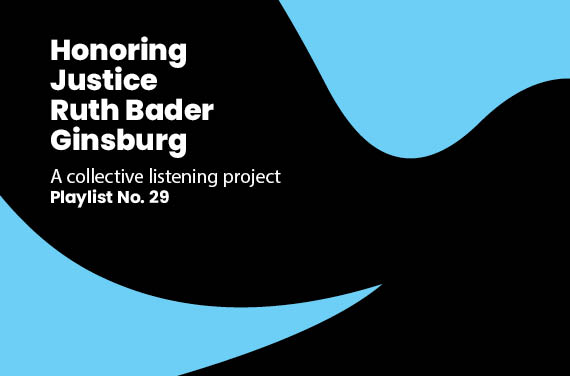Welcome to our 2024-2025 season!
Collective Listening Project
Honoring Justice Ruth Bader Ginsburg
Playlist No. 29
About the Playlist
September 24, 2020

During the 2018/19 concert season—our 125th anniversary—we began a project which we hope to share with you next fall: a book of essays about listening to music that will be published by Princeton University Press. In contribution to this project, Justice Ruth Bader Ginsburg spoke with NPR’s Nina Totenberg about her deep love of music. This week’s Collective Listening Project playlist honors “The Notorious RBG” by sharing the music about which she spoke in that memorable interview. For a full transcript of the conversation, stay tuned in fall 2021!
WOLFGANG AMADEUS MOZART
Là ci darem la mano from Don Giovanni, K. 527, Sir Bryn Terfel, Bass-baritone; Monica Groop, Soprano; London Philharmonic Orchestra, Sir Georg Solti, Conductor
Come scolgio from Cosi fan tutte, K. 588, Elisabeth Schwarzkopf, Soprano; Philharmonia Orchestra, Karl Böhm, Conductor
Voi, che sapete from Le nozze di Figaro, K. 492, Joyce DiDonato, Mezzo-soprano; Orchestre de L’Opéra National de Lyon, Kazushi Ono, Conductor
Don Giovanni, a cenar teco from Don Giovanni, K. 527, Cesare Siepe, Bass; Metropolitan Opera Orchestra, Karl Böhm, Conductor
Mozart was Justice Ginsburg’s favorite composer, and she particularly loved his operas The Marriage of Figaro and Don Giovanni. With a twinkle in her eye, Justice Ginsburg pronounced “Là ci darem la mano” from Don Giovanni to be the “the sexiest duet in all of opera,” especially when performed by the “very handsome” Italian singer Cesare Siepe, “the ultimate Don.” She made sure to expose her children to opera from a young age, recalling how she bought her 8-year-old daughter, Jane, a velvet jumper and patent leather shoes to attend her first opera production of Cosi fan tutte at the Metropolitan Opera.
AMILCARE PONCHIELLI La Gioconda, Orchestra Del Teatro Alla Scala Milano, Antonino Votto, Conductor
Justice Ginsburg’s love affair with opera began thanks to her aunt, who took her to a Brooklyn High School performance of La Gioconda. Despite its bare staging (“but there were costumes!”), she remembered feeling “overwhelmed by the music and the story.”
FRANZ SCHUBERT An mein Herz, D. 860, Matthias Goerne, Baritone
JOHANNES BRAHMS Sandmännchen, WoO 31, No. 4, Angelika Kirchschlager, Mezzo-soprano
We have included two songs to which Justice Ginsburg often listened to at home when she was thinking about cases or writing opinions—she cherished music’s ability to engross the mind.
GAETANO DONIZETTI Convein partir from La figlia del reggimento, Patrizia Zanardi, Soprano; Compagnia d’Opera Italiana Orchestra, Antonello Gotta, conductor
JOHANN STRAUSS II Overture from Die Fledermaus, Berlin Philharmonic, Herbert von Karajan, Conductor
For Justice Ginsburg, only one thing could be better than attending an opera: being in the cast! She made several cameo appearances in operatic productions throughout her career. Justice Ginsburg experienced what felt “like an electric current running through” her during a production of Die Fledermaus, when she sat very close to singer Plácido Domingo. She even had a small speaking role in The Daughter of the Regiment, though she remarked wistfully, “I wish I could sing.”
JAKE HEGGIE from Dead Man Walking, Joyce DiDonato, Mezzo-soprano
In recent years, Justice Ginsburg engaged in a conversation with PUC fan favorite mezzo-soprano Joyce DiDonato about the role of music in finding peace. Justice Ginsburg’s taste in opera was wide ranging and she loved finding new favorite operas in the modern repertoire. Jake Heggie’s Dead Man Walking was one that she remembered fondly.



